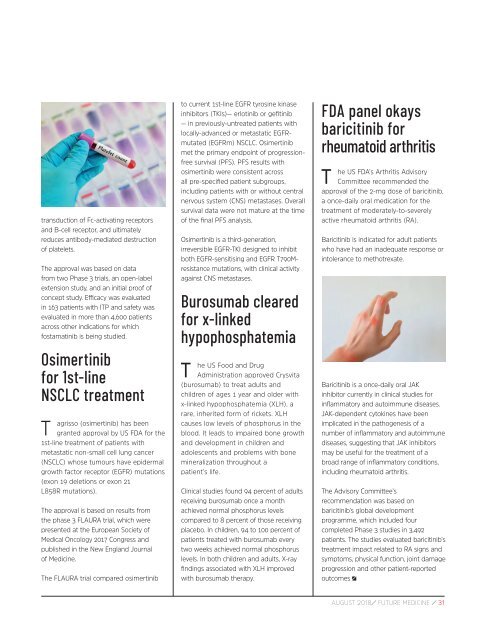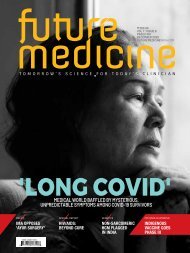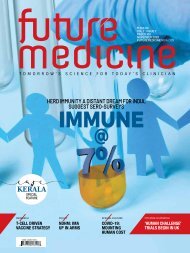FM AUGUST 2018 ISSUE1 - digital edition
Create successful ePaper yourself
Turn your PDF publications into a flip-book with our unique Google optimized e-Paper software.
transduction of Fc-activating receptors<br />
and B-cell receptor, and ultimately<br />
reduces antibody-mediated destruction<br />
of platelets.<br />
The approval was based on data<br />
from two Phase 3 trials, an open-label<br />
extension study, and an initial proof of<br />
concept study. Efficacy was evaluated<br />
in 163 patients with ITP and safety was<br />
evaluated in more than 4,600 patients<br />
across other indications for which<br />
fostamatinib is being studied.<br />
Osimertinib<br />
for 1st-line<br />
NSCLC treatment<br />
T<br />
agrisso (osimertinib) has been<br />
granted approval by US FDA for the<br />
1st-line treatment of patients with<br />
metastatic non-small cell lung cancer<br />
(NSCLC) whose tumours have epidermal<br />
growth factor receptor (EGFR) mutations<br />
(exon 19 deletions or exon 21<br />
L858R mutations).<br />
The approval is based on results from<br />
the phase 3 FLAURA trial, which were<br />
presented at the European Society of<br />
Medical Oncology 2017 Congress and<br />
published in the New England Journal<br />
of Medicine.<br />
The FLAURA trial compared osimertinib<br />
to current 1st-line EGFR tyrosine kinase<br />
inhibitors (TKIs)— erlotinib or gefitinib<br />
— in previously-untreated patients with<br />
locally-advanced or metastatic EGFRmutated<br />
(EGFRm) NSCLC. Osimertinib<br />
met the primary endpoint of progressionfree<br />
survival (PFS). PFS results with<br />
osimertinib were consistent across<br />
all pre-specified patient subgroups,<br />
including patients with or without central<br />
nervous system (CNS) metastases. Overall<br />
survival data were not mature at the time<br />
of the final PFS analysis.<br />
Osimertinib is a third-generation,<br />
irreversible EGFR-TKI designed to inhibit<br />
both EGFR-sensitising and EGFR T790Mresistance<br />
mutations, with clinical activity<br />
against CNS metastases.<br />
Burosumab cleared<br />
for x-linked<br />
hypophosphatemia<br />
T<br />
he US Food and Drug<br />
Administration approved Crysvita<br />
(burosumab) to treat adults and<br />
children of ages 1 year and older with<br />
x-linked hypophosphatemia (XLH), a<br />
rare, inherited form of rickets. XLH<br />
causes low levels of phosphorus in the<br />
blood. It leads to impaired bone growth<br />
and development in children and<br />
adolescents and problems with bone<br />
mineralization throughout a<br />
patient’s life.<br />
Clinical studies found 94 percent of adults<br />
receiving burosumab once a month<br />
achieved normal phosphorus levels<br />
compared to 8 percent of those receiving<br />
placebo. In children, 94 to 100 percent of<br />
patients treated with burosumab every<br />
two weeks achieved normal phosphorus<br />
levels. In both children and adults, X-ray<br />
findings associated with XLH improved<br />
with burosumab therapy.<br />
FDA panel okays<br />
baricitinib for<br />
rheumatoid arthritis<br />
T<br />
he US FDA’s Arthritis Advisory<br />
Committee recommended the<br />
approval of the 2-mg dose of baricitinib,<br />
a once-daily oral medication for the<br />
treatment of moderately-to-severely<br />
active rheumatoid arthritis (RA).<br />
Baricitinib is indicated for adult patients<br />
who have had an inadequate response or<br />
intolerance to methotrexate.<br />
Baricitinib is a once-daily oral JAK<br />
inhibitor currently in clinical studies for<br />
inflammatory and autoimmune diseases.<br />
JAK-dependent cytokines have been<br />
implicated in the pathogenesis of a<br />
number of inflammatory and autoimmune<br />
diseases, suggesting that JAK inhibitors<br />
may be useful for the treatment of a<br />
broad range of inflammatory conditions,<br />
including rheumatoid arthritis.<br />
The Advisory Committee’s<br />
recommendation was based on<br />
baricitinib’s global development<br />
programme, which included four<br />
completed Phase 3 studies in 3,492<br />
patients. The studies evaluated baricitinib’s<br />
treatment impact related to RA signs and<br />
symptoms, physical function, joint damage<br />
progression and other patient-reported<br />
outcomes<br />
<strong>AUGUST</strong> <strong>2018</strong>/ FUTURE MEDICINE / 31


















